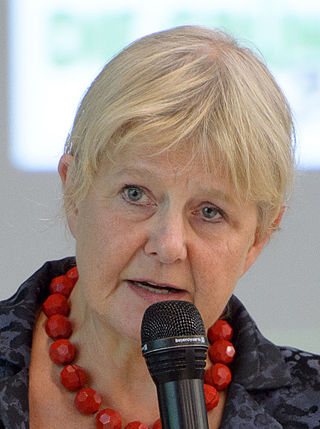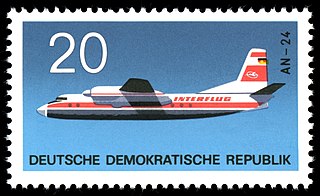
East Germany, officially the German Democratic Republic, was a country in Central Europe from its formation on 7 October 1949 until its reunification with West Germany on 3 October 1990. Until 1989, it was generally viewed as a communist state, and it described itself as a socialist "workers' and peasants' state". The economy of this country was centrally planned and state-owned. Although the GDR had to pay substantial war reparations to the Soviets, it became the most successful economy in the Eastern Bloc.

The Party of Democratic Socialism was a left-wing populist political party in Germany active between 1989 and 2007. It was the legal successor to the communist Socialist Unity Party of Germany (SED), which ruled the German Democratic Republic as the de facto sole legal party until 1990. From 1990 through to 2005, the PDS had been seen as the left-wing "party of the East". While it achieved minimal support in western Germany, it regularly won 15% to 25% of the vote in the eastern new states of Germany, entering coalition governments with the Social Democratic Party of Germany in the federal states of Mecklenburg-Vorpommern and Berlin.

Erich Ernst Paul Honecker was a German communist politician who led the German Democratic Republic from 1971 until shortly before the fall of the Berlin Wall in November 1989. He held the posts of General Secretary of the Socialist Unity Party of Germany (SED) and Chairman of the National Defence Council; in 1976, he replaced Willi Stoph as Chairman of the State Council, the official head of state. As the leader of East Germany, Honecker was viewed as a dictator. During his leadership, the country had close ties to the Soviet Union, which maintained a large army in the country.

The Socialist Unity Party of Germany was the founding and ruling party of the German Democratic Republic from the country's foundation in 1949 until its dissolution after the Peaceful Revolution in 1989. It was a Marxist–Leninist communist party, established in 1946 as a merger of the East German branches of the Communist Party of Germany and Social Democratic Party of Germany.

Hans Modrow was a German politician best known as the last communist premier of East Germany.

The German Communist Party is a communist party in Germany. The DKP supports left positions and was an observer member of the European Left. At the end of February 2016 it left the European party.
Articles related to East Germany include:

The Peaceful Revolution, as a part of the Revolutions of 1989, was the process of sociopolitical change that led to the opening of East Germany's borders with the West, the end of the ruling of the Socialist Unity Party of Germany (SED) in the German Democratic Republic in 1989 and the transition to a parliamentary democracy, which later enabled the reunification of Germany in October 1990. This happened through non-violent initiatives and demonstrations. This period of change is referred to in German as Die Wende.

Margot Honecker was an East German politician and influential member of the country's Communist government until 1989. From 1963 until 1989, she was Minister of National Education of the German Democratic Republic (GDR). She was married to Erich Honecker, leader of East Germany's ruling Socialist Unity Party from 1971 to 1989 and concurrently from 1976 to 1989 the country's head of state.

The Communist Party of Germany is an anti-revisionist Marxist-Leninist communist party in Germany. It is one of several parties which claim the KPD name and/or legacy. It was founded in Berlin in 1990. The party is also commonly referred to by the name KPD-Ost to differentiate it from other parties with the same name, most prominently the historical Communist Party of Germany.

The Left, commonly referred to as the Left Party, is a democratic socialist political party in Germany. The party was founded in 2007 as the result of the merger of the Party of Democratic Socialism (PDS) and Labour and Social Justice – The Electoral Alternative. Through the PDS, the party is the direct descendant of the Marxist–Leninist ruling party of former East Germany, that being the Socialist Unity Party of Germany (SED). Since 2022, The Left's co-chairpersons have been Janine Wissler and Martin Schirdewan. The party holds 28 seats out of 736 in the Bundestag, the federal legislature of Germany, having won 4.9% of votes cast in the 2021 German federal election. Its former parliamentary group was the smallest of six in the Bundestag, and was headed by parliamentary co-leaders Amira Mohamed Ali and Dietmar Bartsch.

Andrej Holm is a German sociologist. His work focuses on urban regeneration, gentrification and housing policy.
Lutz Heilmann is a German politician of the left-wing party Die Linke. He was elected to the Bundestag in the 2005 federal election as a member of the party list in Schleswig-Holstein. Shortly thereafter it was revealed that he had worked for the Stasi from 1985 to 1990. Heilmann drew national and international media attention when he caused the website www.wikipedia.de to be blocked by a preliminary injunction on 13 November 2008. His Bundestag term ended in 2009, and he failed to be nominated for a second term.

Marianne Birthler is a German human rights advocate and politician of the Alliance '90/The Greens. From 2000 to 2011, she served as the Federal Commissioner for the Stasi Records, responsible for investigating the past crimes of the Stasi, the former communist secret police of East Germany. In 2016 she was offered the nomination of the CDU/CSU and her own party for President of Germany, but after some time decided not to run; the parties would have had a majority in the Federal Convention, securing her the election.

Thomas Nord is a German politician and Member of the German Federal Parliament.

The Association of Persecutees of the Nazi Regime – Federation of Antifascists (VVN-BdA) is a German political confederation founded in 1947 and based in Berlin. The VVN-BdA, formerly the VVN, emerged from victims' associations in Germany founded by political opponents to Nazism after the Second World War and the end of the Nazi rule in Germany.
Jutta Braband is a former German politician. In the German Democratic Republic she was a civil rights activist who after 1990 became a PDS member of the Germany parliament (Bundestag). Her parliamentary career ended in May 1992 after it had become known that fifteen years earlier she had worked for the Ministry for State Security (Stasi) as a registered informant .

Christel and Eckhard Wehage were a married East German couple who committed suicide jointly after a hijacking attempt to flee the German Democratic Republic on 10 March 1970 failed.
Heidi Knake-Werner is a German politician. She served as a member of the German parliament ("Bundestag") between 1994 and 2002. Between 2002 and 2009 she was one of Berlin's more high-profile senators.















